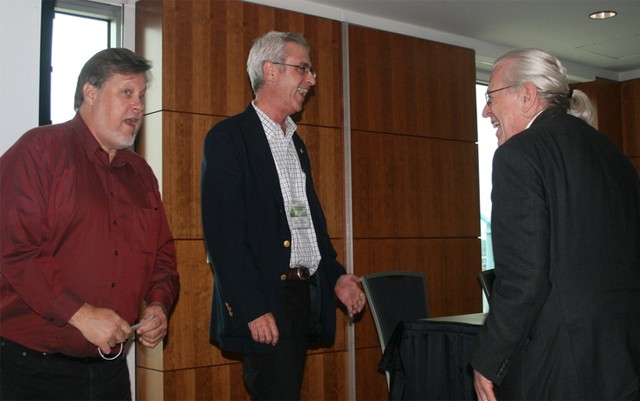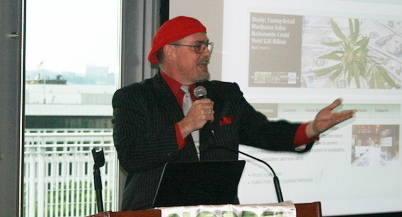
Leading up to NORML’s 2016 lobby day, on Monday, cannabis reform experts spoke about racial injustice, bias in the media, and individual states’ concerns at an educational cannabis conference in Washington, D.C. at The George Washington University Elliott School of International Affairs.
The ‘Police and Pot Prohibition’ panel brought together the leading experts in crime and cannabis. Harry G. Levine, Loren Siegel, and Jon Gettman of Marijuana-Arrests.com, a website dedicated to reporting data on race and marijuana possession arrests, don’t think enough is being done by law enforcement to curb the crippling amount of marijuana possession arrests. Through their work, they arm organizations with the data they use to fight the war on drugs. Among the groups using their information; The Drug Policy Alliance, the New York Civil Liberties Union, the ACLU, the NAACP, and other groups concerned with civil liberties and social justice. A few of these groups were represented on a separate panel to discuss Congress and cannabis.
Siegel and Levine are the directors of the Marijuana Arrests project. Siegel said there’s a lot more work to be done because decriminalization of cannabis is not enough. “Under present conditions – new reports show a phenomenon, that much of municipality budgets come from those who could least afford it all over the country.” In other words, police departments extract money from these people to close the budget gaps. “Decriminalization is a step in the right direction but in the U.S., today, it really means de-penalization,” said Siegel.
Levine, also a leader of the Coalition for Rescheduling Cannabis, and a former head of NORML, spoke about the racial disparity of marijuana possession arrests. The ACLU and many others agree, “significant reform reduces arrest rates but not racial disparities. You have to get rid of criminalization,” he said.
Related Story: NORML Lobby Days Kick Off in Style with Allen St. Pierre Smoking a Golden Joint
Chris Goldstein, a NORML chapter co-chair, spoke about the issues facing consumers in New Jersey and implications of what is to come if New Jersey’s Governor becomes Attorney General for a Donald Trump presidency. “Governor [Chris Christie] is standing behind Trump…the focus needs to be on D.C.” The solution, he says, is to legalize it federally. New Jersey is notoriously known for it’s limited medical marijuana program.
NORML’s Executive Director, Allen St. Pierre, lives in D.C. He declared that NORML has always believed that everyone should be able to grow some cannabis (a right D.C. residents have been afforded since the passing of Initiative 71 in the District). An expert in national cannabis policy, Allen St. Pierre explained dozens of issues related to cannabis cultivation and legalization. For instance, having criminal records for users expunged and amending child endangerment laws to allow legal home use.
Directors of @NORML, @DenverNORML & @WashingtonNorml take the podium to talk post prohibition concerns #NORMLCON16 pic.twitter.com/RfbpuaJbJR
— Chloe Sommers (@ChloeCannaNews) May 23, 2016
State representatives from Virginia to Denver relayed their state-centric concerns. The Virginia NORML Director told me there’s a number of NORML regional sub-groups popping up, and they foresee change coming to their anti-marijuana state. Jordan Person, Executive Director of Denver NORML, understandably has a different set of issues. The Mile High State has medical and recreational legalization in full effect. “Denver’s issue is having a place to consume. We made almost a billion dollars in tax revenue, but tourists get public consumption fees,” she explained. Kevin Oliver, of Washington NORML, spoke about his post-legalization concerns over regulations. “There’s lots of pressures in terms of regulatory compliance keeping the industry on its toes, it’s a cautionary tale.” He warned, “how cannabis rolls out and the freedoms, will there be outdoor pot?” It’s illegal to grow your own in Washington.
Organizations and activists are speaking their truths, but the mainstream media isn’t listening. Kristen Gwynne, editor-at-large for The Influence and Bruce Barcott, Deputy News Director at Leafly discussed why average news reporters aren’t treating cannabis news like any other beat. Gwynne sees a lack of due diligence in finding the best people to interview for a story. In order to better understand the issues, she believes mainstream media needs to interview scientists and drug users, not just law enforcement. Click-bait is another issue facing the entire news industry. As more news outlets rely on their online presence to drive traffic, they are subverting to integrity compromising headlines. “At Leafly, we are trying to find new ways to talk seriously about the fun ways to consume marijuana…In a way that’s fun, but not as a joke,” said Barcott. No one wants to be the ‘pot reporter’ in a newsroom. “But there are all these angles, so many stories there waiting for people to write it,” said Barcott.

Russ Belville, also known to many as ‘Radical Russ’, spoke about marijuana messaging and social media strategies. The radio host explained, “I can do things with my voice that tell a story…I can build relationships with my podcasts.” He also appreciates his listeners, from circuit court judge on his way to work to trimmers working in Colorado. He’s even received messages of thanks from cannabis criminals in jail, telling him that his show gives them hope.
In a first for the organization, NORML awarded the Michael John Kennedy Social Justice Award to criminal defense lawyer, Gerald H. Goldstein, Esq. Named after the lawyer famous for redefining the role of the criminal defender, Michael Kennedy took on clients from the Weather Underground and the Black Panthers, smugglers and pornographers. Kennedy passed away this January and his wife and daughter presented the award. Goldstein accepted, “it’s the proudest moment of my life,” he said.






All out legalization, where any grown adult can grow their own medicine if they choose to do so is the only acceptable solution. Its called Freedom and we supposedly live in a free nation.
I would love to be able to “grow” my own medicine. As it is I live in Arkansas where the “powers that be” STILL say Cannabis has NO medical value. So I am stuck taking Oxycodon AND Oxycontin for my Chronic Nerve Damage Pain. I have been taking this crap for over 13 years and let me tell you IT SUCKS! People tell me to use it anyway, but I am Disabled and on SSI so IF I were to get caught with it that would be the end of my only income. I wish I could afford to move but I can’t. I know there are alot of people in the same boat as me. Just legalize it already! Certain people make WAY to much profit so THEY are fighting legalization any way they can!